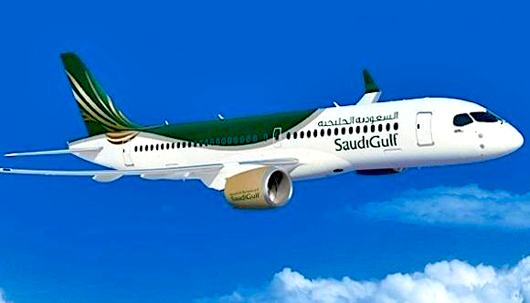Jeddah, May 26: Saudi Gulf Airlines said Monday that it would start operating flights on Nov. 1 from Dammam to Jeddah, Riyadh and one international destination, with more destinations added next year as its fleet expands.

The statement follows a meeting between Sulaiman Al-Hamadan, president of the General Authority of Civil Aviation, and Tariq bin Abdel Hadi Al-Qahtani, chairman of the airline’s board of directors. “Saudi Gulf plans to fly from Dammam to three destinations, initially with a fleet of four Airbus A320s,” said Samer Majali, the group’s president and senior adviser.
“We are working with GACA in preparation for starting operations to obtain the technical license,” Majali said. The airline’s domestic flights will offer first class and economy fares, while international flights will provide business class and economy class services. In addition to the A320 aircraft, the airline signed a $2 billion deal with Canada’s Bombardier last year to purchase 16 CSeries jets with an option for a further 10.
Delivery of the CS300 jets, which can carry 130 to 160 passengers, is expected to begin late this year or early 2016. Majali said additional aircraft would join the fleet after the delivery of the A320s and CSeries jets.
“We are happy to welcome Saudi Gulf as a new operator in the Kingdom,” said Al-Hamdan, adding that it would strengthen competition between airline companies to provide better services to passengers.
“We believe that the increase in the number of airlines will improve air transport services between Saudi cities and regions and boost the Kingdom’s social and economic development,” the GACA chief said.
During the meeting, Saudi Gulf presented its operation plans. “They have a primary license and the final license will be given when they complete final preparations for operations,” said GACA spokesman Wael Al-Sarhan.
Only national carrier Saudi Arabian Airlines and budget operator National Air Services currently serve a domestic market of about 27 million people. Foreign carriers can only fly in and out of Saudi Arabia, not within the country, but that will change when Qatar Airways obtains regulatory approval to launch its subsidiary Al Maha Airways for the Saudi market.






Comments
Add new comment